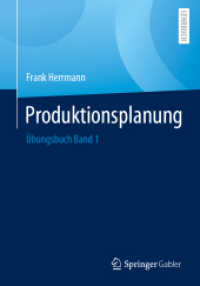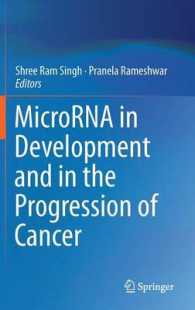- ホーム
- > 洋書
- > 英文書
- > Religion / Ethics
Full Description
Any serious consideration of Asian American life forces us to reframe the way we talk about racism and antiracism. There are two contemporary approaches to antiracist theory and practice. The first emphasizes racial identity to the exclusion of political economy, making racialized life in America illegible. This approach's prevalence, in the academy and beyond, now rises to the level of established doctrine. The second approach views racial identity as the function of a particular political economy--what is called "racial capitalism>--and therefore analytically subordinates racial identity to political economy.
Jonathan Tran develops arguments in favor of this second approach. He does so by means of an extended analysis of two case studies: a Chinese migrant settlement in the Mississippi Delta (1868-1969) and the Redeemer Community Church in the Bayview/Hunters Point section of San Francisco (1969-present). While his analysis is focused on particular groups and persons, he uses it to examine more broadly racial capitalism's processes and commitments at the sites of their structural and systemic unfolding. In pursuing a research agenda that pushes beyond the narrow confines of racial identity, Tran reaches back to trusted modes of analysis that have been obscured by the prevailing antiracist orthodoxy and proposes reframing antiracism in terms of a theologically salient account of political economy.
Contents
Preface and Note on Method
Introduction
Part I: The Delta Chinese
Chapter 1: Remythologizing the Model Minority Myth: The Chinese Question
Chapter 2: A Moving Picture of Racial Capitalism
Chapter 3: Becoming White in the White/Black Binary
Part II: Redeemer Community Church
Chapter 4: Redeemer Community Church and All That Lies Beneath
Chapter 5: Deep Economy: Dayspring's Doxology
Chapter 6: Rise University Preparatory and the Politics of Hope
Postscript: Beyond Marxism
Bibliography
Acknowledgments
Index







